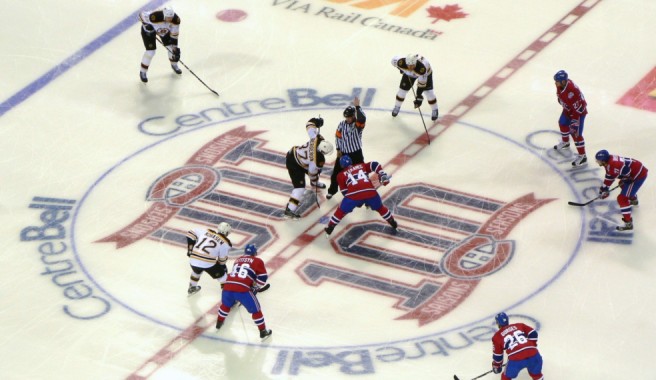a Treatise on making Canadian Theatre more like Hockey
As winter rolls around again, I find that more and more of my evenings (and much of my precious mental energy during the ever-shortening days) is occupied by the other of my great passions: Hockey.
 As did many Canadians, I grew up with the game, my father being a 3rd generation Montreal Canadiens fan despite our family’s geography in rural southwestern Ontario: My brother and I both played, albeit badly; I watched the Habs win their last Cup in ’93 from Dad’s lap; and I call in sick for games against Boston. And, like clockwork, with the first breaths of spring in the air I can eagerly await my life being swallowed up by intense and often torturous emotional turmoil, the likes of which go hand-in-hand with being a die-hard fan of any team.
As did many Canadians, I grew up with the game, my father being a 3rd generation Montreal Canadiens fan despite our family’s geography in rural southwestern Ontario: My brother and I both played, albeit badly; I watched the Habs win their last Cup in ’93 from Dad’s lap; and I call in sick for games against Boston. And, like clockwork, with the first breaths of spring in the air I can eagerly await my life being swallowed up by intense and often torturous emotional turmoil, the likes of which go hand-in-hand with being a die-hard fan of any team.
But what becomes of my other passion during this momentous season, this Christmastime-in-April? After all, there’s another venue in which I have some expertise, one which (curiously enough) also features the vicarious experience of intense emotion by way of larger-than-life figures, and the collective breath-holding of real people anxiously awaiting who will come out the winner, who the loser. But, if Theatre and Hockey have as much in common as it would appear, then why will I practically abandon the rest of my life for months at a time – as many as four nights a week for solid three-hour stints – to watch with bated breath as the Habs pursue one game at-a-time the holy grail of their life’s-work, while a theatrical production (pursuing the no-less admirable or arduously earned holy grail of artistic revelation) can seldom tempt me out the front door to give up a single evening and 15 bucks? How can the NHL fill a 21,273 seat auditorium 41 times a year at minimum 70 dollars a head while theatres across Canada struggle to fill 50 seat black box theatres and studios, sometimes with the help of government funding?
Of course, several notable differences spring immediately to mind, but I think we as Theatre-makers would be too easy on ourselves to attribute this stark difference in success solely to the massiveness of corporate funding and advertisement for the NHL, or the ease of watching a game from the comfort of your home as opposed to walking or driving to your local theatre, or even that Hockey appeals to a wider audience-base due to its history and cultural ties with Canadians everywhere. I think these are all valid concerns, and ones that give Hockey and the NHL in particular a sizeable leg-up in terms of competition with other entertainment industries, Theatre included. However, at the same time I believe that reducing Theatre’s failure to compete with Hockey as an enjoyable way to spend an evening in Canada to being victim to these advantages is to wash our hands of our own responsibility to fix what’s wrong with our art. Otherwise, we will be forced to admit that, unlike Hockey, Theatre is not an art form for the people – at least not in Canada.
In the upcoming essay I hope to conduct a thorough comparison of Hockey and Theatre as performative art-forms (for those of you who would take issue with this claim itself, we’ll address it soon) within the cultural climate of the Great White North, and to derive from this exploration a treatise on what Canadian Theatre Companies can learn from the success of Hockey (and the National Hockey League) in Canada, as well as the steps that I believe necessary to translate these successes to Theatre and to facilitate their implementation for the Canadian Stage.
I will begin by briefly comparing Hockey and Theatre as live performance events, in spite of their often disparate fan-bases – focusing on what the two share, and whether or not we can consider Canadian Hockey as ‘Art’ in the same way we do Theatre. The philosophical distinction drawn, we will examine the polarized success stories of both Hockey and Theatre in Canada and draw parallels between their current management structure, publicity, and product. The overlying scene being outlined, we will then establish a list of practices by which Canadian Theatres can emulate the cultural success of Hockey through expanding and accentuating their similarities and adopting superior practices more in-line with today’s performance industry.
We have long been plagued by the perception that Theatre is a dying art-form, one which has lost touch with popular opinion and no longer serves as an accessible way for us to collectively explore our shared humanity. I am certain, however, that by looking ahead to a cornerstone of our national culture and identity, Theatre in Canada can regain its waning relevance by bringing some of the nail-biting, ref-abusing, hero-worshipping passion of the Stanley Cup Playoffs into our empty theatres.
(I’ll be re-posting this essay in parts, section-by-section as I transfer them from my old website, so follow me to keep posted as I release the rest – I’ll promise not to keep you waiting too long. I’d love for this to be a communal exploration, so if you have thoughts to share on anything I’ve mentioned here, or anything else you think I ought to explore, feel free to make your case in the comments section below. Thanks for reading, and until next time.)